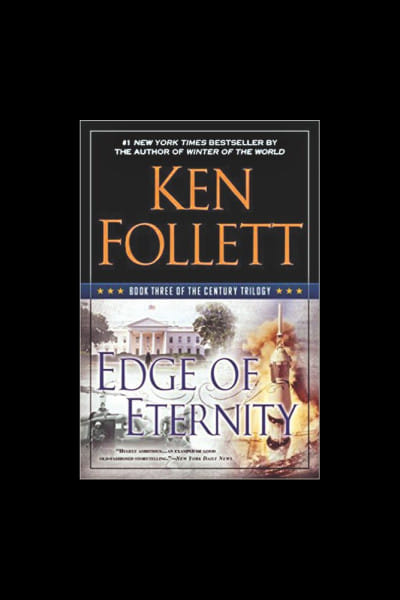Edge of Eternity: Fiction and Geopolitics Integrated

Ken Follett, an eminent Welsh author of our time, has a superb knack for blending political events with the personal lives of people through his fictional works. There were plenty of discourses with a fictional flavour on global geopolitical issues in his books like Fall of Giants and Winter of the World. In 2014 he came back with another sensational story Edge of Eternity, a voluminous novel and no surprise that this one also tells personal stories of its characters with underpinnings of political impacts. Ken Follett has trailed the destinies of five interlinked families hailing from America, Germany, Russia, England and Wales in this novel and outstandingly sketched the way these families lived through the vicissitudes of the twentieth century.
The civil rights movement of America, assassinations of Martin Luther King and John F. Kennedy, impeachment of Richard Nixon from the US presidential post, the Vietnam War, the Cold War smokescreen, the US military tussles with Cuba, the fall of Berlin Wall and the collapse of communism in former Soviet Union—all these decisive events have been addressed in Edge of Eternity. So, Edge of Eternity is a full-bloomed historic novel covering a broad range of incidents that have turned a lot of things upside down around the globe since World War II.
The plight of the East German people has been illustrated through the life of Rebecca Hoffman in this novel. The widespread cobwebs of Soviet-sponsored espionage that entangled people living in East Europe during the Cold War period is depicted with a nail-biting description through the struggle of Rebecca Hoffman. George Jakes, an American citizen finds himself virtually in the pliers of a crab having been brought up by cross-race parents. Dmitry Dvorkin, a young secretary to Nikita Khrushchev witnesses with blood-chilling alarm the nuclear race between the USA and Soviet Union while his twin sister Tania travels from Russia to Cuba to Poland and to Czechoslovakia (present day Czech Republic) as a journalist. Edge of Eternity is a substantial and highly evidential book for a deeper understanding of the global phenomena that prevailed during the time the NATO and Warsaw troops looked into each other's eyeballs with their fingers fixed on the triggers. That was an era of uncertainty, suspicions, worries and intrigues that spread out a tapestry of puzzles from the White House to Kremlin, from Washington to Hanoi, from Moscow to Beijing like a convoluted chessboard. It was the time while Martin Luther King was delivering fiery speeches against racism and segregation. It was the time while thousands of Americans demonstrated on the streets of major US cities deploring America's role in the Vietnam War. And it was the time while an almost impervious iron curtain blocked the east from the west and the antagonism between the US-led nations and the countries submissive to Soviet Union loomed large. Moreover, Soviet Union invaded Afghanistan during the same time and the Soviet-Afghan war went on for nearly a decade.
However, like the geopolitical transformations of the world, the storyline of Edge of Eternity undergoes changes too. East and West Germany merged in the wake of the fall of Berlin Wall. Millions of Russians poured out on to the streets of Moscow, St. Petersburg and other parts of Russia yelling watchwords against socialism leading to the decline of communist regime in their country and the disintegration of the USSR. Lots of Russian families migrated from Russia to western states following the fall of USSR succumbing to the disillusionment caused by the failure of communism to survive and to avoid the sociopolitical disorder that gripped Russia during 90s. So, the fall of socialism in Russia was not just the closing episode of an ideology, but a tale of dispersion of thousands of Russian citizens from their motherland to England and to USA, an unprecedented form of diaspora they had never imagined that would sweep across their lives.
Ken Follett's scrutiny with history through his exclusive fictional dexterity almost reaches the height of the story-telling quality of Sir Walter Scott, Ted Allbeury and Margaret Mitchell as far as their art of synthesizing history with literature is concerned, particularly recalling their novels Ivanhoe, The Other Side of Silence and Gone with the Wind respectively. Ken Follett's novels including Edge of Eternity give trustworthy details about the way political upheavals rampage people's fates, pull them away from their roots and land them under unforeseen circumstances. Wars, revolutions, financial doldrums, territorial turbulence have all along disarrayed people's lives and dreams. History of human civilization bears plenty of such evidences.
The families we find in Edge of Eternity speak of the predicaments of millions of families worldwide living under constant threats of perils and anarchy. Simultaneously, Edge of Eternity tells a story of resilience of human beings by means of which human race survives through untoward situations like wars, violence and other cataclysms.
The reviewer is a Senior Lecturer, Department of English, Metropolitan University, Sylhet.

 For all latest news, follow The Daily Star's Google News channel.
For all latest news, follow The Daily Star's Google News channel. 



Comments